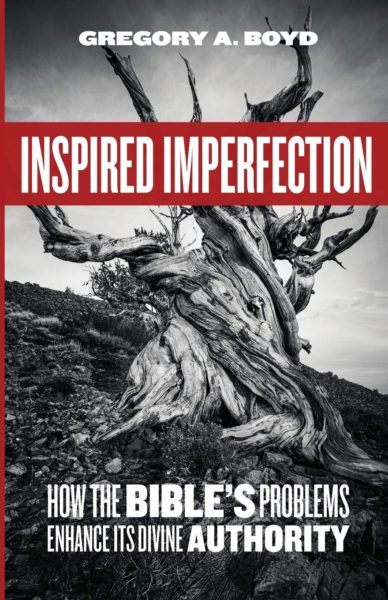Inspired Imperfection

I remember asking a question to a professor when I was in my undergrad program: “What resource do you recommend to someone wrestling with the inconsistencies between the God of the Old Testament and Jesus in the New Testament?” I was pointed to a Biblical textbook that was a generic overview of the Bible. Needless to say, this didn’t actually address my question.
Yet it opened my eyes to the gap of people willing to talk objectively about some of the issues with the Bible (and the Old Testament in particular) without either dismissing it or glossing over it. It wasn’t until I met Greg Boyd years later that I found someone willing to tackle this in a way that resonated with me.
Greg’s latest book is called Inspired Imperfection: How the Bible’s Problems Enhance Its Divine Authority (see: Amazon link). I wish this would have existed when I was in college and first beginning to dive into this idea for myself.
One of the surprising gems was an update on how Greg is using more precise language in describing God in male and female terms. This has been something I’ve thought much about for the last few years but had not arrived at any great solution. I think Greg settles into a workable solution here that won’t sound like a provocative distraction when used.
“I’ve tried to strike a balance of sorts in this book. As you may have already noticed, I will use “God†and “Godself†(rather than “he†and “himselfâ€) when referring to God, the first Person of the Trinity, or when referring to God as Trinity. For obvious reasons, I will use “he†and “himself†when referring to Jesus. And, since “Spirit†(pneuma) is feminine in Greek, and since there is some precedent for this in the church tradition, I will use “she†and “herself†whenever I refer to the Holy Spirit.”
I’ve already started to try and adopt this wording verbally. (Fun fact: Michelle and I are preaching together on Mother’s Day and exploring the subject of God as Mother/feminine).
Here are a few of the quotes in the book that capture Greg’s argument about the Bible:
It was precisely because I based my faith in Jesus on my faith in the Bible that I lost my faith.
I believe the Bible should play an irreplaceable role as the foundation for what Christians are to believe and for how Christians ought to live. As I said earlier, faith in the Bible’s inspiration has served as the indispensable rudder of the church throughout history. But I’m afraid you are skating on very thin ice if you make the Bible the foundation for why you believe in Jesus in the first place.
Everything in Scripture, from its errors and contradictions to its morally offensive depictions of God to its most sublime and insightful material is equally inspired by God when God sovereignly chooses to have it bear witness to Jesus Christ.
If Jesus is the center of Scripture, the cross is its epicenter.
On the cross, God breathed the full revelation of Godself through God’s fully human Son as he bore the sin and God-forsaken curse of the fallen human race. But we wouldn’t say that the cross fully reveals God in spite of the humanity, the sin, and the God-forsaken curse that Jesus bore. To the contrary, the cross fully reveals God precisely because it reveals a God who, out of unfathomable love, was willing to stoop to an unsurpassable distance to enter into solidarity with our humanity, our sin, and our God-forsaken curse.
When we consider what is involved in the inspiration of Scripture, shouldn’t we expect that it too will sometimes involve God stooping to identify with the weakness, foolishness, and guilt of those whom God is breathing God’s self-revelation through? To think otherwise, it seems to me, is to suggest that the way God breathed God’s fullest revelation on the cross is completely unlike the way God breathed the story of God that bears witness to the cross, which is tantamount to denying that the cross reveals what God has always been like.
Viewed in light of the cross, every mistake, every contradiction, and every sub-Christ-like portrait of God becomes a sort of literary crucifix within the story of God that confirms that God has always been doing what God does in a supreme way on the cross.
At first glance, some of these ideas may seem a bit extreme. Yet I’ve found that few people are willing to talk about some of the trickier aspects of the Bible and then propose real solutions with how to resolve them. You may not fully resonate with Greg’s proposed solutions, but I’ve yet to find anyone offering a solution that looks more like Jesus.
If you’ve asked the same question as I did those years ago, you owe it to yourself to read this and find the good news that it all points to Jesus.
Do You Want to Read the Bible Without Falling Behind?
Sign up your email and I’ll send you a PDF to download and use my custom-made reading plan system. There’s no way to fall behind on this system and every day will be different no matter how long you use it!
I’ll send future content directly to your inbox AND you can dive into the Bible like never before.




